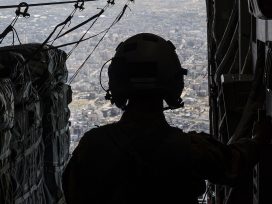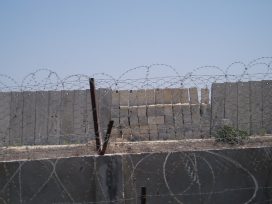In her 1963 book On Revolution, Hannah Arendt castigated pity – a diffuse, top-down sentiment – and praised compassion, which seeks to bridge rather than maintain divisions. Most of us know, based on the intimate experiences of our own lives, how intuitively right Arendt’s preference was: how, that is, compassion is both more encompassing and more focused than pity, and how it seeks to create an I-thou relation rather than a hierarchical one. Compassion does not suggest that our experiences, or the conditions of our lives, are equal or interchangeable, but it acknowledges the possibility of a shared human condition. Arendt called compassion a kind of “co-suffering”. But she added, somewhat startlingly, that compassion “remains, politically speaking, irrelevant”. For Arendt, the realm of the political was the realm of reasoned debate, disputation and rational judgment, whereas compassion was emotional, self-evident and inarguable.
It is a sign of the great distance between Arendt’s time and ours that compassion – whose objective form is humanitarian action – has become not only politically relevant but politically central. Since the fall of the Berlin Wall, questions of humanitarian intervention (and even of “humanitarian war”) have been at the very heart of the fiercest political debates, and humanitarian organisations such as Médecins sans Frontières (MSF) and Oxfam are looked to not just for their ability to provide medicine and food but as moral and political arbiters of world crises. At the same time, the relationships between humanitarian aid and human rights (a concept that Arendt herself scorned) have become deeply – some would say inextricably – intertwined. Many humanitarian organisations have expanded their briefs to include the upholding of human rights (and of economic development, which some now claim is a subset of rights), while human-rights organisations increasingly venture into the humanitarian and development fields. Whether this is a good thing or a bad thing – a necessary, morally exigent advance or a hubristic, tragic blunder – is hotly contested, as a series of recent books (and real-world events) make clear.
The background to these books – and to the crisis of humanitarianism – is to be found in the 1990s, a period of high hopes and drastic failures for humanitarian aid groups and the United Nations. With the end of the Cold War, three tendencies emerged and created what was, in retrospect, a perfect storm. First, there was, among many leftists, a disillusion with what might be called “actually existing” politics – and with the socialist ideal itself, which was now apparently defunct; at the same time, the end of superpower rivalries led to optimistic forecasts about a dawning era of peace and prosperity. For many progressives, humanitarian action came to substitute for traditional political work – and to be seen as the only dependably good cause that remained; one result was the tremendous growth in non-governmental organisations (NGOs) and the expansion of their duties.
 Second, there was the emergence of astonishingly brutal, apparently unstoppable, often non-ideological civil wars, whose combatants specifically targeted civilians in especially grotesque ways: vaginal mutilation in the Congo, mass rape in Darfur, amputation in Sierra Leone, kidnappings in Uganda, and the widespread use of children as soldiers and sex slaves. The political theorist John Keane has termed such conflicts “uncivil wars”, whose protagonists are beholden to no rules “except those of destructiveness – of people, property, the infrastructure, places of historical importance, even nature itself”. Such wars permanently damage what Keane calls “the ecology of human personality” and erode the “capacity to […] act in solidarity” with others. They also call into question our commitment to – and the necessary preconditions for – international solidarity.
Second, there was the emergence of astonishingly brutal, apparently unstoppable, often non-ideological civil wars, whose combatants specifically targeted civilians in especially grotesque ways: vaginal mutilation in the Congo, mass rape in Darfur, amputation in Sierra Leone, kidnappings in Uganda, and the widespread use of children as soldiers and sex slaves. The political theorist John Keane has termed such conflicts “uncivil wars”, whose protagonists are beholden to no rules “except those of destructiveness – of people, property, the infrastructure, places of historical importance, even nature itself”. Such wars permanently damage what Keane calls “the ecology of human personality” and erode the “capacity to […] act in solidarity” with others. They also call into question our commitment to – and the necessary preconditions for – international solidarity.
Third, as a result of, and response to, these other factors, there was a great increase in United Nations peacekeeping missions, though often in places where there was no peace to keep. It was hard, at the time, for many activists, journalists, humanitarians, theorists and politicians to understand how interconnected these forces were. In retrospect, though, it is clear that they created a toxic brew, one that thrust the humanitarian movement into what David Rieff, in his book A Bed for the Night: Humanitarianism in Crisis, called a “cognitive and moral meltdown”. There were various way stations on this road – including Somalia, Sierra Leone, Liberia, Sudan, East Timor and Afghanistan – but the two most influential were undoubtedly the war in Bosnia and the genocide in Rwanda. In the former, the nadir of the “world community’s” impotence was, of course, Srebrenica, where almost 8,000 unarmed Muslims were murdered in one of the UN’s so-called safe havens. In Rwanda, the UN, along with most aid agencies, pulled out as the genocide began. Then came the perverse post-genocide shower of aid to the Hutus, who had perpetrated the genocide, and the eager influx of aid agencies into the self-created Hutu refugee camps of Goma, which became bases for re-arming by the génocidaires. Yes, the humanitarian organisations were caring for cholera victims – but they were also feeding killers. MSF, along with the International Rescue Committee (IRC) and CARE, took the highly unusual action of withdrawing from the camps.
These stunning events led many aid workers to conclude that the traditional humanitarian stance of neutrality and non-intervention was grossly inadequate in addressing the new realities of these new wars. What does it mean to offer provisions to civilians who have been openly targeted for slaughter – or, even worse, offer provisions to the slaughterers themselves? At what point should aid groups cease negotiating, or cooperating, with ethnic cleansers, homicidal militias and rape squads? What does it mean to temporarily alleviate the suffering of people who are in need of the most drastic changes in the political, economic, cultural and moral conditions that determine their lives? Is it possible for humanitarians to uphold the values of human rights in places where, as the late MSF theorist François Jean wrote, “The [Enlightenment] values we claim to represent are barely audible”? Should aid groups, which are dedicated to the preservation of life, ever demand military intervention – as CARE, the IRC and Oxfam did in Somalia (1992), and MSF and Oxfam in Rwanda two years later? And how to respond when the provision of aid might actually prolong a famine or a war, or be used by a repellent regime to fortify itself – as was the case in Ethiopia and is the case in Sudan?
These are complex, indeed agonising, questions that – precisely because they defeat certainty – deserve to be addressed with gravity and humility. Alas, there is little of that to be found in War Games, Linda Polman’s scantily sourced new book, which reads more like a malicious screed than a thoughtful addition to the humanitarian literature.
Polman is a Dutch journalist who has travelled to many of the world’s worst places and reported, for years, on war and humanitarian crises. But perhaps she has been in the field too long, and seen too much, for there is an undisciplined, almost hysterical tone to her book. She does, however, expose the contradictions and, especially, corruptions of humanitarian aid.
She finds humanitarians living in luxury (or at least relative luxury) amidst utter impoverishment; humanitarians who “cared for child soldiers and war orphans by day and relaxed by night in the arms of child prostitutes”; humanitarian organisations that spend their money on expensive Land Rovers instead of on building orphanages. She finds inappropriate – indeed, grossly insulting – aid: starving Somalis who are given laxatives, Kenyan children who are given dog food, tsunami victims who are given Viagra. In the Congo, in Sudan – indeed, everywhere – she finds humanitarian groups paying off warlords, terrorists, mercenaries and child soldiers in order to gain access to their beleaguered populations. She reports on how some of the world’s most pathologically murderous groups – the Khmer Rouge, the Taliban, Somali warlords – have been nurtured by NGOs in refugee camps. And she does not spare the victims: in Sierra Leone, she finds amputees who wave their stumps – for pay – for photographers and refuse to wear their prostheses “when white people are around”, and who pawn their crippled children off to foreign traffickers.
All this is ugly; but then again, humanitarian organisations operate, by definition, amidst the ugliest conflicts on earth. What is to be done? To this question, Polman offers virtually no answers – or, even worse, incoherent answers – which makes her desire for a cleaner, purer form of humanitarianism difficult to take seriously. She charges, for instance, that since 9/11 humanitarian organisations, especially those in Afghanistan, have abrogated their independence and become stooges of the US military; at the same time, she castigates NGOs for their stance of neutrality, and insists that they become more politicised. She writes that the Taliban has targeted international aid workers because they are seen as “collaborators” with a foreign occupation. This may be true; but then again, the Taliban has targeted an awfully wide range of native Afghans – teachers, doctors, journalists, lawyers, feminists, secularists, women (of all sorts), farmers, market-goers, shepherds, adulterers and schoolgirls – as collaborators and infidels who are, apparently, eminently worthy of death. She charges that journalists have given humanitarian organisations a free ride, largely ignoring the crucial, critical work of writers such as Alex de Waal, Philip Gourevitch and Rieff. Worst of all, she seems oblivious to the urgent, thoughtful self-critiques in which MSF, Oxfam and other groups are engaged, and of the work of humanitarian theorist/activists like Rony Brauman and François Jean. All these writers have something that Polman sorely lacks: an understanding of the necessary failures and heartbreaking limits that humanitarian work entails. Polman’s angry indictment of “spineless” humanitarian organisations and her often-shocking examples of corruption and hyprocrisy, are inflammatory and highly quotable. (In a recent interview with the Observer, she suggested that some aid workers might be “war criminals”.) But the picture she paints lacks nuance, and does little to untangle, much less solve, the deep dilemmas of humanitarian aid.
In contrast, Irene Khan’s The Unheard Truth demonstrates the ways in which human-rights organisations have expanded their very definition of rights – and the possibilities and problems such expansions entail. Khan – who was born in East Pakistan (now Bangladesh) into an educated, professional family – was, until recently, the secretary-general of Amnesty International. Founded in 1961 to protect and free “prisoners of conscience”, Amnesty defined its mission in narrow terms (it originally would not support Nelson Mandela because he had advocated violence). Amnesty prided itself on its strictly non-partisan approach, campaigning for the release of activists held by both Western and socialist countries. But it essentially accepted the Cold War division of rights: defined by the capitalist countries in solely political terms (thus rejecting any economic component) and by the socialist countries in solely economic terms (rejecting any political component). Amnesty was, one might say, implicitly yet firmly in the capitalist-liberal camp.
But the limits of this orientation chafed; as Khan writes, the organisation’s “traditional approach appeared to privilege elites within the countries where it was working. They would demand free speech on behalf of journalists and dissidents but not the right to education of poor children. They would observe high-profile political trials but fail to address impunity for violence against women.” And so, responding to both external criticisms and internal pressures, in the ensuing years Amnesty began to speak out on a much wider range of issues, including the death penalty, refugee rights and arms sales to oppressive regimes. In 1977 it won the Nobel Peace Prize; in 2001 – after much debate and dissension – it officially changed its mandate to include the defence of “economic, cultural and social rights” including food, shelter, health care and security.
Khan’s book celebrates this shift; indeed, she conflates human rights with the end of poverty, and vice versa. “Poverty is the denial of human rights,” she begins; defeating poverty is, therefore, “first and foremost about securing respect for human rights”. For Khan, human rights mean the end of poverty, and poverty is the absence of human rights: “Poverty is not primarily about economics and income levels. It is about […] powerlessness […] and that is why poverty is first and foremost about rights […] The struggle to end poverty […] is a struggle for freedom, justice and dignity.” In Khan we find the synthesis of the capitalist-socialist rights divide, or what she calls the “holistic” approach to rights embodied in the 1948 Universal Declaration of Human Rights.
All this is well and good (if somewhat tautological). The problem is that Khan evades the implications of her own argument. “There is nothing inherent in the character of certain rights which makes them more or less political than others,” she writes. This is obviously untrue – as free-speech advocates in China and universal health-care advocates in the US know well. In fact, in virtually every country, certain rights are indisputable, while others are not considered “rights” at all. Defining food, shelter, education and medicine as rights is, in itself, a profoundly political stance: not a legal or even moral one, as Khan implies. It is precisely this refusal of politics – and the willingness to identify oneself with politics – that elicits doubt, and even scorn, from human-rights critics.
This evasion of the tough fights – and the tough decisions – is most evident when Khan turns to the question of domain. “Human rights are universal,” she writes (a statement that is theoretically true – though, as Khan herself writes, obviously has not been made true for most of the people on earth). “The obligation to act should trump concerns about sovereignty when a country’s record is utterly dismal.” Here Khan touches on – but quickly runs away from – the most heated debates of our time: humanitarian neutrality and humanitarian intervention, the limits (if any) of national self-determination, the international community’s “responsibility to protect”, and the question of just war. How should we respond to the next Bosnia – or the next Rwanda? To the next Sierra Leone or Kosovo – or, for that matter, to the current Somalia or Zimbabwe or Darfur? Are these humanitarian crimes? Political crises? Both? Neither?
It is these questions that Conor Foley addresses in The Thin Blue Line, an analysis of “how humanitarianism went to war”. Foley is an aid worker who has worked in, among other places, Kosovo, Bosnia and Afghanistan. While I disagree with some of his analyses and conclusions, the thoughtfulness, humility and specificity with which he approaches the thorniest problems should be a model for other writers, and stand in sharp contrast to Polman’s diatribes and Khan’s platitudes. “The notion of a responsibility to act’ lies at the heart of the humanitarian impulse,” Foley begins. “It was what had taken me from Kosovo to Kabul. […] The idea that we should do something’ […] underpins our basic concept of global solidarity.” But how does one act? And what if the consequences of one’s actions – and principles – are vastly different than intended?
Foley looks at a number of conflicts – Somalia, Afghanistan, Sri Lanka, East Timor – and comes to less than comforting conclusions. Multilateralism – the new holy grail for some – is no guarantee of an intervention’s success. Consider, for instance, Operation Restore Hope, which was designed to send massive food shipments to starving Somalis, and which was unanimously approved by the permanent UN Security Council in late 1992. Ending famine was, of course, a good idea. But this famine (like so many others) was caused not by drought or bad crops but by the implosion of the Somali state and its increasingly nihilistic civil war.
The failure to adequately understand and address those realities proved catastrophic. Food was looted and stolen by armed militias rather than distributed to the needy; aid workers were murdered, leading some humanitarian organisations to break with their longstanding principles and use armed guards or demand military intervention; UN troops from Pakistan were “literally ripped limb from limb while escorting a food convoy”; and two US Black Hawk helicopters were shot down, leading to the death and dismemberment of American soldiers and a hasty withdrawal (which would have calamitous consequences when the war in Bosnia and the genocide in Rwanda broke out). In retrospect, Operation Restore Hope has been accused of doing very little to feed Somalis – though it’s not clear that this was possible – and much to sustain the country’s war economy (which is, in fact, Somalia’s only economy); and it raised, in particularly sharp terms, the limits of humanitarian efforts in the midst of “uncivil wars”. As Foley observes, “The Somali mission had been authorised by the UN, was properly funded and had a sufficiently robust mandate, yet it ended in ignominy and its failure directly contributed to the disasters that followed elsewhere.”
Foley’s experiences in Afghanistan – he worked there in 2003, 2004 and 2008 – furnish a particularly valuable section. He writes of arriving in an utterly immiserated country whose civil war “over the previous twenty-two years was such that it was difficult to find anything left to bomb”. He found a country based on “sexual apartheid”, and he writes of his unease as he and other aid workers try to adjudicate the case of a 13-year-old girl who had fled a forced marriage to a much older man, to whom she had been sold at the age of nine. “How far could we intervene in Afghanistan’s internal affairs while maintaining our neutrality,” Foley wonders, “and how far could we stray from our mandate by failing to protect people from violations of their basic human rights?” In short, Foley found himself working – though he is a bit too politically correct to say so – within a clash of civilisations.
But the main issue that Foley addresses in his Afghanistan chapter is the increasing entanglement of humanitarian projects and the military. Early on, he observes the efforts of Provisional Reconstruction Teams, in which uniformed soldiers accompanied aid workers (or vice versa). “Most humanitarian workers had mixed feelings,” Foley admits. “We welcomed anything that could bring greater security to Afghanistan’s anarchic countryside, but we could also see that aid was being used to promote explicitly political objectives […] which would compromise the way we were viewed by the various protagonists.” By 2004, he notes, the Afghanistan mission was “clearly […] different” from “the one most of us had joined,” for “the humanitarian effort had become part of a wider counter-insurgency operation.” This is a partnership that some aid organisations have vigorously opposed (see, for instance, MSF’s increasingly urgent post-9/11 press releases on the importance of humanitarian independence). Foley opposes it too, yet he sees how hard it is to formulate an alternative strategy. In the Afghan war, he writes, military and humanitarian forces “were becoming objectively indistinguishable. We both wanted to strengthen law and order, weaken the warlords, combat corruption and support human rights. These were all worthy objectives – and it is difficult to see how Afghanistan can attain a reasonable future without them – but they were also clearly political, which meant that we were taking sides in what was turning into a bitter conflict.”
Ultimately – or, at least, so far – Foley judges Afghanistan to be an almost complete failure, with a too weak international presence, non-functional security systems, no rule of law, rampant corruption, a Parliament dominated by warlords (who have generously awarded themselves amnesty), a resurgent Taliban, and an international (read US) policy characterised by “inertia, drift and then panic and delusion”. And it is Afghanistan, Foley argues, that shows “how the debate over military interventions and humanitarian assistance has gone full circle. In previous conflicts critics of humanitarian aid have complained that it was used as an excuse for not taking the military action needed to save lives. Now in Afghanistan, […] aid was being used to support the military.” How to break this circle remains unclear.
Foley is obviously, indeed proudly, a man of the left. But he rebuts – and I am grateful that he does – the analysis of the Chomskyite left, which insists that humanitarian action is a form of neo-imperialism. Equally important, he rejects the isolationism to which such an analysis necessarily leads: an isolationism that, he rightly charges, “negate[s] the entire tradition of international solidarity”. And though he recognises the deep connections between humanitarian aid, human rights and development, Foley, like Rieff, ultimately comes down on the side of a more limited, less ambitious humanitarian movement, one that upholds the traditional values of independence, impartiality and neutrality: “The belief that the international community can ever conjure peace out of chaos created an arrogance of expectation,” he observes. “This has gradually given way to a cynical disillusionment.” What is needed, he argues, is “a much more pragmatic and realistic approach to the issue of intervention.” Yet Foley is aware, I think, of how fatally flawed and morally agonising that limited approach proved to be when confronted with uncivil war and barbarous violence, which is what makes his position not just paradoxical but tragic.
Surely what is needed, too, is an end to the evasion of politics, and the attempt to substitute humanitarian action for it. The refusal of world leaders to see the events in Bosnia and Rwanda as political crises rather than humanitarian ones led to the rape, ruin and murder of millions. The attempt by the US government to recast the overthrow of the Taliban, and then of Saddam, as humanitarian rather than political acts has confused and probably prolonged the wars in Iraq and Afghanistan. Humanitarianism is, pace Polman, an often noble enterprise – despite his fierce criticisms, Rieff calls humanitarians “the last of the just” – but it was never meant to topple tyrants, end wars, redistribute wealth or solve political conflicts. Humanitarianism has been burdened with tasks it cannot accomplish, which is part of what makes the present moment both unutterably sad and terrifying.
States, however, are not the only ones who use humanitarianism as an alibi, a fig leaf or a moral detergent. So do political groups. The recent “Freedom Flotilla” of the Turkish ship Mavi Marmara – which resulted in the deaths of nine pro-Palestinian civilian activists – is the perfect example of political evasion. The flotilla was organised by the Turkish NGO group known in the West as the IHH, and by the Free Gaza movement of which it is a part; neither is a “humanitarian” organisation. Indeed, both the Turkish group and the larger movement openly stated that the flotilla’s aim was to “break” the Israeli siege of Gaza. One can agree or disagree with this mission, but one cannot call it anything but political.
It is true that, as humanitarians (and humanitarian critics) like to say, “There are no humanitarian solutions to humanitarian problems.” But surely it is even truer – and equally important to point out – that there are no humanitarian solutions to the political crises that are tearing our world apart.

 Second, there was the emergence of astonishingly brutal, apparently unstoppable, often non-ideological civil wars, whose combatants specifically targeted civilians in especially grotesque ways: vaginal mutilation in the Congo, mass rape in Darfur, amputation in Sierra Leone, kidnappings in Uganda, and the widespread use of children as soldiers and sex slaves. The political theorist John Keane has termed such conflicts “uncivil wars”, whose protagonists are beholden to no rules “except those of destructiveness – of people, property, the infrastructure, places of historical importance, even nature itself”. Such wars permanently damage what Keane calls “the ecology of human personality” and erode the “capacity to […] act in solidarity” with others. They also call into question our commitment to – and the necessary preconditions for – international solidarity.
Second, there was the emergence of astonishingly brutal, apparently unstoppable, often non-ideological civil wars, whose combatants specifically targeted civilians in especially grotesque ways: vaginal mutilation in the Congo, mass rape in Darfur, amputation in Sierra Leone, kidnappings in Uganda, and the widespread use of children as soldiers and sex slaves. The political theorist John Keane has termed such conflicts “uncivil wars”, whose protagonists are beholden to no rules “except those of destructiveness – of people, property, the infrastructure, places of historical importance, even nature itself”. Such wars permanently damage what Keane calls “the ecology of human personality” and erode the “capacity to […] act in solidarity” with others. They also call into question our commitment to – and the necessary preconditions for – international solidarity.




